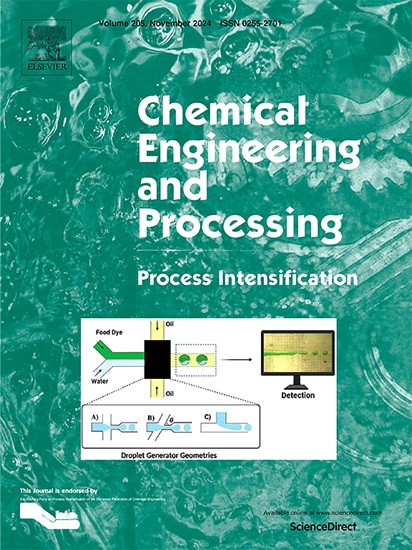Intensification and enhancement of phenolic compounds extraction using cooperative formulation
IF 3.8
3区 工程技术
Q3 ENERGY & FUELS
Chemical Engineering and Processing - Process Intensification
Pub Date : 2025-02-19
DOI:10.1016/j.cep.2025.110220
引用次数: 0
Abstract
In this study, intensification of palm oil mill steriliser condensate as a potential secondary source of phenolic compounds (PCs) were investigated. Synergistic reactive extraction with cooperative formulation appeared as a promising approach for recovering PCs, offering several advantages such as high selectivity, simplicity, ease of scale-up, and efficiency. The organic phase was formulated using mixture of vegetable oils as a sustainable green diluent. The carrier was added into the organic phase to select the potential base and synergist carriers in order to improve the extraction performance of PCs. The complexes of carrier-PC was study for the recovery purpose. A synergist stripping agent was formulated using mixture of salt. The finding indicated that about 93.33% of PCs were successfully extracted with a synergistic coefficient (SC) value of 5.09 using 0.25 M Aliquat 336 and 2.0 mM D2EHPA diluted in mixed vegetable oils of sunflower and palm oil at a ratio of 60:40. Meanwhile, the recovery study demonstrated that 0.04 M Na2CO3/1.00 M NaOH was selected as the stripping performance was up to 99.99% with SC value of 2.13. Consequently, the synergistic formulation employed in reactive extraction process demonstrates potential for the recovery of PCs from palm oil mill steriliser condensate.

求助全文
约1分钟内获得全文
求助全文
来源期刊
CiteScore
7.80
自引率
9.30%
发文量
408
审稿时长
49 days
期刊介绍:
Chemical Engineering and Processing: Process Intensification is intended for practicing researchers in industry and academia, working in the field of Process Engineering and related to the subject of Process Intensification.Articles published in the Journal demonstrate how novel discoveries, developments and theories in the field of Process Engineering and in particular Process Intensification may be used for analysis and design of innovative equipment and processing methods with substantially improved sustainability, efficiency and environmental performance.

 求助内容:
求助内容: 应助结果提醒方式:
应助结果提醒方式:


